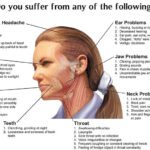Sore and sensitive teeth are the most common indications of a disorder called TMD or Temporomandibular Joint Disorder or TMJ. You will normally hear individuals talk about their TMJ issues. It is related to the jaw joint or temporomandibular joint. The TMJ is a little joint in the front of every ear that connects the lower jaw with the skull and is the most complex joint in the human body. The region of the face where the temporomandibular joint is positioned is an intricate system of bones including the nerves, teeth, and muscles. This network controls numerous parts of the body from the head to toe.
TMJ or TMD terms are used to explain a set of symptoms that include:
1. Severe headaches
2. Jaw pain
3. Facial pain
4. Shoulder pain
5. Neck pain
6. Restricted jaw movement
7. Click and pop noises of the jaw
8. Jaw Locking
9. Numbness of arms and fingers
10. Sensitive and sore teeth
Teeth grinding, recurring ear infections, snoring and limited airway are different issues commonly linked with TMD.
An exceptionally skilled neuromuscular dental specialist can alleviate your TMJ issues including sore teeth by assessing your bite and fixing your misaligned bite. By and large, TMJ is caused by malocclusion or misaligned bite. As you experience the bad effects of malocclusion, your lower and upper teeth don’t close together in the right way; this causes under or overbites. At the point when your teeth are not aligned appropriately, they can’t give the support the muscles in the face require for biting and gulping. These muscles are then constrained into a stressed position, which brings about pain and restricted jaw movement.
Neuromuscular dental practitioners determine the most comfortable position of your jaw to decide the objective for normal situating. Then the dental specialist attempts to realign your bite and restore your teeth hence, the jaw to their ideal position. Once your bite is adjusted appropriately, your problems, including sore teeth will vanish.
What are The Reasons Behind TMD
The reasons for TMJ are as yet not clear, but according to the specialists, some of the possible causes include:
1. Clenching or grinding your teeth puts a lot of pressure on TMD
2. Displacement of the disc between the socket and ball
3. Rheumatoid arthritis or Osteoarthritis
4. Anxiety, which makes you clench your teeth or stiffen jaw and facial muscles
Therapy for TMD varies from extremely moderate to more powerful, including surgery and injections. Your neuromuscular dental specialist will examine the numerous treatment alternatives accessible to you once your case is assessed and evaluated comprehensively.
Once the TMD dentist has decided that you are indeed suffering from a case of temporomandibular disorder, they will then go over what your options are for treatment. The severity your TMD will determine the depth of your treatment. Some minor cases can be treated at home by applying ice packs to the area and by stretching the jaw with exercises designed to increase the flexibility and mobility of the joints of the jaw.
Getting restorative dental work done to replace missing teeth and straighten any overbites can work wonders to improving this condition. Since it caused from extra stress on the jaw, by reducing the strain and pressure, the condition can be successfully treated.









